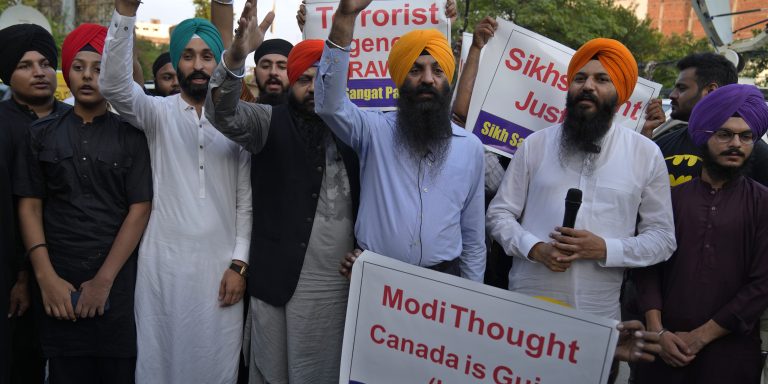INTELBRIEF
October 5, 2023
IntelBrief: Transnational Repression on the Rise as States Struggle to Respond

Bottom Line Up Front
- With the recent murder of a Canadian citizen in Vancouver, allegedly by agents of the Indian government, the issue of transnational repression is once again front and center.
- Russia, Iran, China, Saudi Arabia, India, and Türkiye are just some of the countries that engage in transnational repression, which occurs when foreign governments stalk, intimidate, or assault individuals outside of their home countries.
- Beijing has been accused of establishing secret police stations around the world, including in North America and Europe, which collect information on dissidents, political opponents, and critics of the Chinese Communist Party (CCP).
- Autocrats and strongmen who engage in transnational repression may reach the conclusion that taking the risk is worthwhile, especially if they feel that the consequences will be minimal, as they appear to be in the case of Saudi Arabia.
With the recent murder of Canadian citizen and alleged separatist leader Hardeep Singh Nijjar in Vancouver, reportedly by agents of the Indian government, the issue of transnational repression is once again front and center. There are myriad forms of transnational repression, including but not limited to: stalking, harassment, hacking, assaults, attempted kidnapping, forcing or coercing the victim to return to their home country, threatening or detaining targets’ family members in their home country, freezing financial assets, and online disinformation campaigns. Frequent targets of transnational repression include political and human rights activists, dissidents, journalists, political opponents, and members of religious or ethnic minority groups. Russia, Iran, China, Saudi Arabia, Türkiye – and now, apparently, India – are just some of the countries that have engaged in this practice. Transnational repression is a type of foreign interference and can take the form of a targeted killing, as appears to be the case with Nijjar. Other examples abound. In February 2017, Kim Jong-nam, the half-brother of North Korean dictator Kim Jong-un, was assassinated in Kuala Lumpur, Malaysia, by individuals using the nerve agent VX, a highly lethal chemical weapon. On multiple occasions, Russian military intelligence officers have conducted attacks against targets on European soil, using deadly nerve agents against dissidents and former Russian intelligence officials.
In the United States, there are several notable examples from just the past several years. In January 2020, a dual U.S.-Iranian citizen and an Iranian citizen who was a resident of California were sentenced to prison for criminal convictions related to conducting surveillance of and collecting identifying information about American citizens and U.S. nationals. Iranian intelligence services have also been accused of operating on U.S. soil while planning to kidnap and murder a U.S. journalist and human rights activist living in New York City. The plot involved perpetrators from an Eastern European criminal organization working at the behest of Iranian operatives, leading U.S. Deputy Attorney General Lisa O. Monaco to warn that “increasingly, we are seeing national security and criminal threats blend, as rogue nations and criminal organizations make common cause and share capabilities.” Iran has also been linked to several high-profile assassination plots, including a plot to kill former U.S. National Security Adviser John Bolton and another dating back to 2011 allegedly targeting Saudi Arabia’s then-ambassador to the United States, Adel al-Jubeir.
China has also engaged in transnational repression by stalking, harassing, and intimidating U.S. residents. Beijing has been accused of establishing secret police stations in countries around the world, including in North America and Europe. From various clandestine offices, Chinese agents work to collect information on dissidents, political opponents, and critics of the Chinese Communist Party (CCP). One such station operated in the heart of New York City, where the U.S. Department of Justice claims that the Chinese government attempted to locate pro-democracy activists and others critical of Beijing to suppress their right to free speech. Sometimes, as an element of transnational repression, states cancel the passports of individuals living abroad to limit their freedom of movement and control their ability to travel.
In October 2018, Washington Post journalist Jamal Khashoggi was murdered at the Saudi consulate in Istanbul by individuals linked to the Saudi government. The U.S. intelligence community has assessed that fifteen Saudi agents were deployed to Istanbul to carry out the operation, which was allegedly approved by Saudi Crown Prince Mohammed bin Salman (MBS). The Biden administration initially labeled Saudi Arabia as a pariah but has since reversed course and now seems to embrace Riyadh as central to its objectives in the Middle East. Accordingly, autocrats and strongmen who engage in transnational repression may reach the conclusion that taking the risk is worthwhile, especially if they feel that the consequences will be minimal, as they appear to be in the case of Saudi Arabia. Indian Prime Minister Narendra Modi may have made a similar calculation, betting that New Delhi’s importance as a bulwark to a rising China affords him with the leeway to engage in acts similar to the one that led to the ongoing rift with Canada.